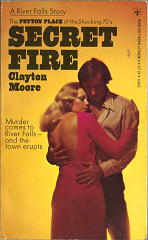Sat 14 Apr 2012
CLAYTON MOORE – Secret Fire. Berkley, paperback original; 1st printing, January 1975.

Our next entry in this blog’s “How Obscure Can You Get?†obsession is almost totally so, in my opinion. Notwithstanding the fact that this is the sixth book in the author’s “River Falls†series, making it appear to have been reasonably popular at the time, its time has come and gone, with very few still alive to remember – and it was published only 37 years ago.
There are five copies available for sale on ABE, but it will cost you $12 (plus shipping) to get one in more than only good condition. (And keep in mind that in book parlance, “good†does not mean good.) An unexplained, suspicious death does occur, and a trial takes up most of the second half of the book, but it is not (yet) included in Al Hubin’s Crime Fiction IV, although two of the earlier books in the series are. (As a brief aside, I do not know how many books in the series there are. This one appears to be the last, but one with very low sales may have come along later.)
One wonders – and if you are the one who has been wondering, I am not surprised – if the author of this book is also the one who played The Lone Ranger on TV for so many years. The answer, you may not be surprised to learn, is No. This “Clayton Moore†is reputedly the pen name of an author named Marilyn Granbeck, one of many she used over the course of a steady but none too spectacular writing career. (Among many other books, she also wrote one in the long-running “Nick Carter†series.)
UPDATE. I have been corrected on the identity of the two authors who collaborated as “Clayton Moore,” neither of whom was Marilyn Granbeck. See the comments for more.
And with this, enough inside shop talk. The book itself reminded me of a combination of Peyton Place and Anatomy of a Murder, without Grace Metalious’s innate ability of really getting under the skin and into the heart (so to speak) of a small town’s secrets, the skeletons they’d rather keep hidden, nor Robert Traver’s intimate knowledge of the law. But what “Moore†does have is the sheer readability of both, one that demands you keep reading once begun – as it did me as I read one chapter in order to see what kind of book is was, and that was all it took.
Dead is an aged but famous musical conductor and composer. Accused of hastening his death, in lieu of several more months of pain – the man had inoperable cancer – is the town’s doctor. The amiable but crusty type who has patients who swear by him, and perhaps an equal number who swear at him, thus dividing the town’s population nearly in half, making this, as far as they are concerned, the trial of the century.
All kinds of secrets, of course, are revealed along the way, and you should not be surprised to learn that sexual ones are high on the list. There is little surprise to find out who done it, should you read on so far, which (I admit) I doubt you will. But in case you do, you may find yourself enjoying it, perhaps as much as I did.
April 14th, 2012 at 11:36 pm
Actually, Clayton Moore is not a pen name of Marilyn Granbeck but a joint pseudonym of Clayton Matthews and Arthur Moore. Marilyn and Art Moore were a couple in the 70s (I knew them moderately well back then), which may be the reason for the misconception. Marilyn wrote of a number of novels under her own name and the pseudonym M.R. Henderson, but SECRET FIRE is not one of them. A complete list of her publications is listed on her website: http://www.mysterymentor.com/about.html
April 15th, 2012 at 12:06 am
Clarification: The forgotten novels Marilyn Granbeck mentions on her website as having written under male pseudonyms and house names were mysteries, gothics, and romantic suspense for such bottom line paperback houses as Manor Books and Major Books. SECRET FIRE was not one of them, however, but rather a Matthews/Moore collaboration.
April 15th, 2012 at 12:21 am
Thanks, Bill. First of all that explains where the name “Clayton Moore” came from. Why Marilyn Granbeck would choose to write under the name of a cowboy actor was a puzzle. (It still is a puzzle why Matthews and Moore did, but it does explain where the name came from.)
In any case, this is more news to send Al Hubin. It was his CFIV that I got all this “shop talk” information from, and he’ll want to know.